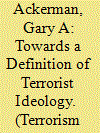|
|
|
Sort Order |
|
|
|
Items / Page
|
|
|
|
|
|
|
| Srl | Item |
| 1 |
ID:
183008


|
|
|
|
|
| Summary/Abstract |
While conventional wisdom holds that the ideology espoused by a terrorist organization is somehow related to that organization’s actions, the precise nature of the relationship between these phenomena is hotly debated, with scholarship often yielding contrasting empirical results. We argue that one reason for this divergence in viewpoints and research findings is an inadequate understanding of what ideology actually is and how it relates to terrorism. Indeed, the terrorism literature reveals widely disparate uses of the concept of terrorist ideology. This article endeavors to provide a common framework for approaching ideology in the context of terrorism studies by systematically building a new definition of terrorist ideology from first principles. In so doing, we introduce a definition of terrorist ideology that is logically consistent, has robust theoretical underpinnings, and connects the study of ideology within terrorism to broader disciplinary research traditions regarding ideology. This provides a conceptual foundation from which to examine terrorist ideology in an objective, systematic manner and thereby enables terrorism researchers to more productively investigate important outstanding questions, such as which aspects of an ideology are most relevant to violent behavior.
|
|
|
|
|
|
|
|
|
|
|
|
|
|
|
|
| 2 |
ID:
111972


|
|
|
|
|
| Publication |
2012.
|
| Summary/Abstract |
Since the early 1990s, the large-N civil war research program has been a vibrant one but has reached an analytical plateau because methodological issues have obscured fundamental conceptual and theoretical concerns. The existing ground-clearing work has shed light on macro- and micro-level determinants of internal conflict onset, duration, and termination, but has left the field theoretically impoverished. This article discusses remaining gaps in the quantitative civil war literature, and proposes conceptual, theoretical, and methodological remedies. Five main lacunae are identified. First, civil war may be a longer process, with several waves of escalation and de-escalation, than generally described in the extant literature. Second, existing theories conflate civil conflict with violence-war onset and violence may be conceptually distinct. Third, we have few systemic-level theories of civil war onset and duration. Fourth, we need better theories that allow us to determine whether civil wars are different from other types of wars. Finally, we need to go beyond state-centric monadic approaches, and be more rigorous when building our models for explaining civil war onset, duration, or termination.
|
|
|
|
|
|
|
|
|
|
|
|
|
|
|
|
|
|
|
|
|